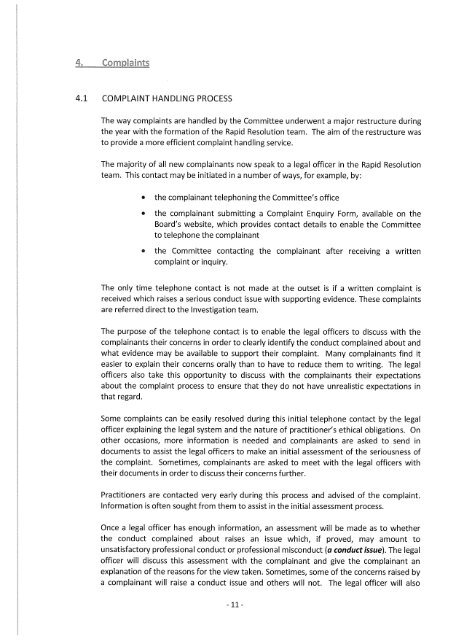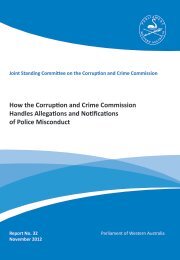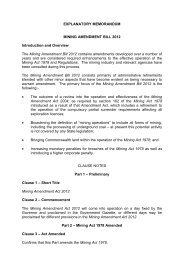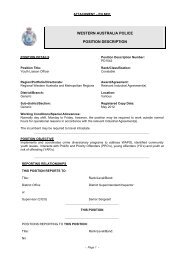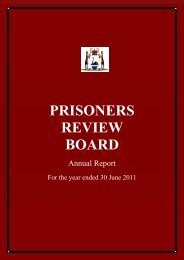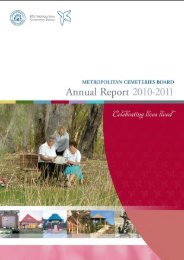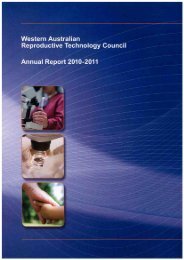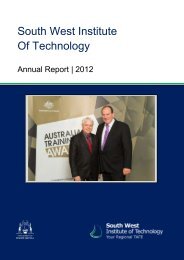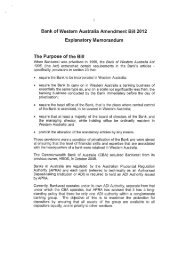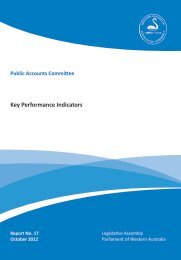Tabled Paper - Parliament of Western Australia
Tabled Paper - Parliament of Western Australia
Tabled Paper - Parliament of Western Australia
Create successful ePaper yourself
Turn your PDF publications into a flip-book with our unique Google optimized e-Paper software.
4.1 COMPLAINT HANDLING PROCESS<br />
The way complaints are handled by the Committee underwent a major restructure during<br />
the year with the formation <strong>of</strong> the Rapid Resolution team. The aim <strong>of</strong> the restructure was<br />
to provide a more efficient complaint handling service.<br />
The majority <strong>of</strong> all new complainants now speak to a legal <strong>of</strong>ficer in the Rapid Resolution<br />
team. This contact may be initiated in a number <strong>of</strong> ways, for example, by:<br />
the complainant telephoning the Committee's <strong>of</strong>fice<br />
the complainant submitting a Complaint Enquiry Form, available on the<br />
Board's website, which provides contact details to enable the Committee<br />
to telephone the complainant<br />
the Committee contacting the complainant after receiving a written<br />
complaint or inquiry.<br />
The only time telephone contact is not made at the outset is if a written complaint is<br />
received which raises a serious conduct issue with supporting evidence. These complaints<br />
are referred direct to the Investigation team.<br />
The purpose <strong>of</strong> the telephone contact is to enable the legal <strong>of</strong>ficers to discuss with the<br />
complainants their concerns in order to clearly identify the conduct complained about and<br />
what evidence may be available to support their complaint. Many complainants find it<br />
easier to explain their concerns orally than to have to reduce them to writing. The legal<br />
<strong>of</strong>ficers also take this opportunity to discuss with the complainants their expectations<br />
about the complaint process to ensure that they do not have unrealistic expectations in<br />
that regard.<br />
Some complaints can be easily resolved during this initial telephone contact by the legal<br />
<strong>of</strong>ficer explaining the legal system and the nature <strong>of</strong> practitioner's ethical obligations. On<br />
other occasions, more information is needed and complainants are asked to send in<br />
documents to assist the legal <strong>of</strong>ficers to make an initial assessment <strong>of</strong> the seriousness <strong>of</strong><br />
the complaint. Sometimes, complainants are asked to meet with the legal <strong>of</strong>ficers with<br />
their documents in order to discuss their concerns further.<br />
Practitioners are contacted very early during this process and advised <strong>of</strong> the complaint.<br />
Information is <strong>of</strong>ten sought from them to assist in the initial assessment process.<br />
Once a legal <strong>of</strong>ficer has enough information, an assessment will be made as to whether<br />
the conduct complained about raises an issue which, if proved, may amount to<br />
unsatisfactory pr<strong>of</strong>essional conduct or pr<strong>of</strong>essional misconduct (a conduct issue). The legal<br />
<strong>of</strong>ficer will discuss this assessment with the complainant and give the complainant an<br />
explanation <strong>of</strong> the reasons for the view taken. Sometimes, some <strong>of</strong> the concerns raised by<br />
a complainant will raise a conduct issue and others will not. The legal <strong>of</strong>ficer will also


